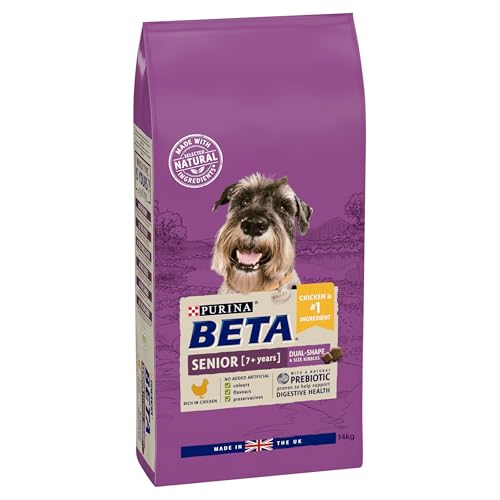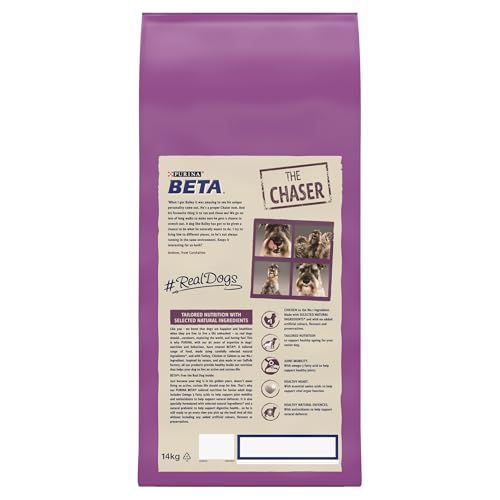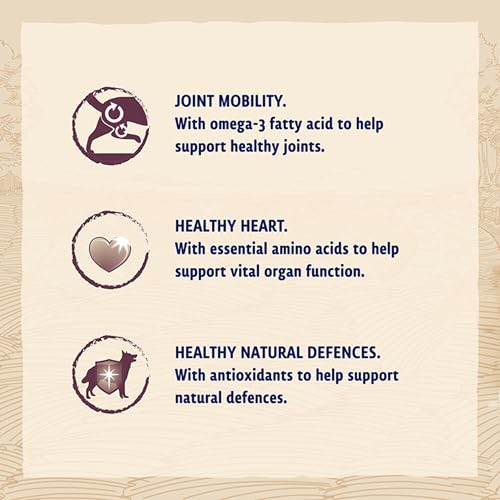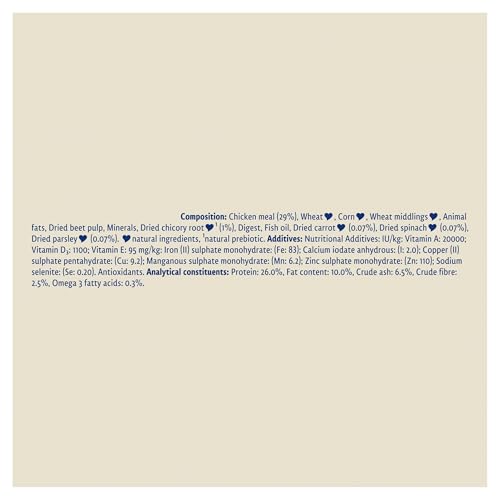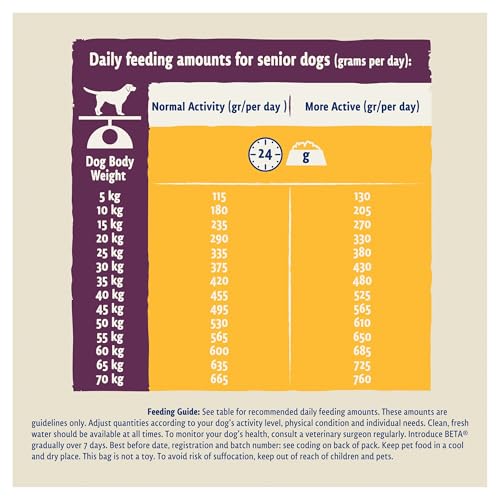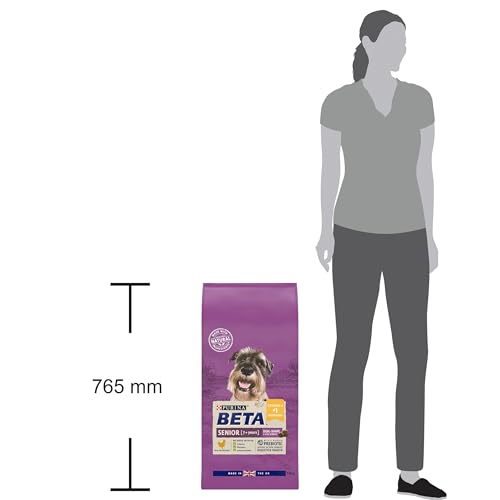

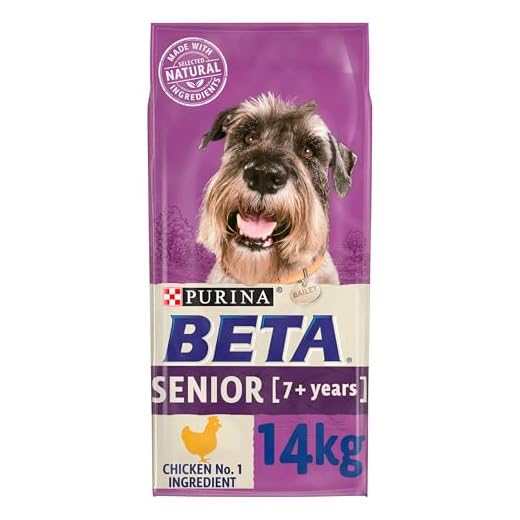


As our beloved canine companions age, their dietary needs evolve, requiring us to make thoughtful adjustments to their meals. The quest for the best dog food for senior dogs is more than just a journey through pet food aisles; it’s about ensuring our furry friends maintain their health, vitality, and happiness in their golden years. Drawing on veterinary recommendations and the latest nutritional research, I’ve compiled this guide to help you navigate the myriad of options available and make the best choice for your senior dog’s unique needs.
Understanding the specific nutritional needs of senior dogs is paramount. As dogs age, they often face a range of health challenges, from decreased energy levels and joint issues to more serious conditions like kidney disease and heart problems. A diet rich in essential nutrients, balanced in protein and low in calories, can make a significant difference in their quality of life. With insights from veterinarians, I’ve identified key ingredients and formulations that support the health and well-being of senior dogs.
In this article, I will delve into the top vet-recommended dog foods tailored for senior dogs. I’ll explore the benefits of each product, highlight their unique features, and provide guidance on what to look for when selecting the right food for your ageing pet. By the end of this guide, you’ll have a clear understanding of how to choose the best nutrition to keep your senior dog thriving. Let’s embark on this important journey together, ensuring our loyal companions enjoy their twilight years with the best possible health and happiness.
Why Senior Dogs Need Special Nutrition
As our beloved dogs age, their nutritional requirements evolve, necessitating adjustments in their diet to maintain optimal health. Senior dogs, generally considered those over the age of seven, often face various health challenges that can be mitigated with appropriate dietary changes. Tailoring their nutrition can significantly impact their quality of life and longevity.
Older dogs typically experience a slowdown in metabolism, reduced activity levels, and the onset of age-related health issues. This combination can lead to weight gain and associated health problems such as diabetes, arthritis, and heart disease. Special nutrition designed for senior dogs can help manage their weight by providing balanced caloric intake while ensuring they receive essential nutrients.
Key Nutritional Considerations for Senior Dogs
- Joint Health: As dogs age, joint wear and tear can lead to arthritis and other mobility issues. Diets rich in omega-3 fatty acids, glucosamine, and chondroitin can support joint health and reduce inflammation.
- Digestive Health: Older dogs often experience digestive issues. Easily digestible proteins and added fibre can promote gastrointestinal health and ensure better nutrient absorption.
- Immune System Support: The immune system weakens with age, making senior dogs more susceptible to infections and diseases. Antioxidants such as vitamins E and C, along with beta-carotene, can help bolster their immune response.
- Weight Management: Senior dog foods often have reduced calories and fats to prevent obesity. They also include L-carnitine to help metabolise fat and maintain lean muscle mass.
Another critical aspect of senior dog nutrition is ensuring adequate hydration. Older dogs may not drink enough water, leading to dehydration and related health issues. Wet food or specially formulated dry food with higher moisture content can help maintain proper hydration levels.
Finally, consider that senior dogs may have dental issues that make chewing difficult. Softer kibbles or wet food options can alleviate this problem, ensuring they continue to eat well and receive the necessary nutrients.
By understanding and addressing the unique nutritional needs of senior dogs, we can help them enjoy their golden years with vitality and happiness.
Key Nutrients for Senior Dog Health
As our dogs age, their nutritional needs change significantly. Ensuring they receive the right balance of nutrients is essential for maintaining their health and quality of life. Older dogs often require a diet that addresses specific health concerns, such as joint health, cognitive function, and immune support.
Incorporating the appropriate nutrients into their diet can help manage age-related issues and keep your senior dog happy and healthy. Below, I will discuss the key nutrients that play a crucial role in supporting the well-being of our senior canine companions.
Important Nutrients for Senior Dogs
-
Protein: High-quality protein is vital for maintaining muscle mass and overall body condition. As dogs age, they can lose muscle mass, making protein an essential part of their diet to support muscle maintenance and repair.
-
Omega-3 Fatty Acids: These fatty acids, particularly DHA and EPA, are beneficial for reducing inflammation and supporting joint health. They also play a role in maintaining cognitive function, which can decline in older dogs.
-
Fibre: Adequate fibre helps with digestion and can prevent constipation, a common issue in senior dogs. It also aids in maintaining a healthy weight by promoting a feeling of fullness.
-
Antioxidants: Vitamins C and E, along with other antioxidants, are crucial for boosting the immune system. They help protect cells from damage caused by free radicals, which can contribute to ageing and disease.
-
Glucosamine and Chondroitin: These supplements are important for joint health, helping to maintain cartilage and reduce the symptoms of arthritis, which is common in older dogs.
-
Calcium and Phosphorus: Balanced levels of these minerals are necessary for maintaining strong bones and teeth. An appropriate ratio is important to prevent bone deterioration and related issues.
-
B Vitamins: These vitamins support energy metabolism and are essential for overall cellular function. They can help maintain your dog’s energy levels and overall vitality.
By focusing on these key nutrients, you can help ensure your senior dog receives the nutrition they need to thrive in their golden years. Always consult with your vet to tailor a diet that meets the specific health needs of your older dog.
Vet Recommended Dog Food Brands for Senior Dogs
As our beloved dogs grow older, their nutritional needs change. Selecting the right food can make a significant difference in their health and longevity. Ensuring your senior dog receives a balanced diet, tailored to their specific needs, is crucial for maintaining their vitality and well-being.
Veterinarians often recommend certain brands that cater specifically to the dietary requirements of older dogs. These brands focus on providing a balance of proteins, fats, and essential nutrients to support aging joints, digestion, and overall health.
Highly Recommended Brands for Senior Dogs
Based on veterinary advice, several dog food brands stand out for their formulations targeted at senior dogs. These brands are known for their quality ingredients, scientific approach, and commitment to the health of older pets.
1. Hill’s Science DietHill’s Science Diet is frequently recommended by vets for its scientifically-backed recipes. The brand offers senior-specific formulas that include antioxidants for immune support, balanced minerals for heart and kidney health, and high-quality protein for lean muscle maintenance.
2. Royal CaninRoyal Canin tailors its food to specific breed sizes and health issues, making it a versatile choice for senior dogs. Their senior formulas often feature adjusted phosphorus levels to support kidney health, along with nutrients for joint support and overall vitality.
3. Purina Pro PlanPurina Pro Plan is another vet favourite, especially for its focus on digestive health and skin nourishment. Their senior dog food options include live probiotics for gut health, glucosamine for joint care, and omega-6 fatty acids for a healthy coat.
4. Blue BuffaloBlue Buffalo is known for its natural ingredients and life protection formulas. Their senior dog recipes often include deboned chicken, whole grains, and garden vegetables, enriched with LifeSource Bits – a blend of antioxidants, vitamins, and minerals selected by holistic veterinarians and animal nutritionists.
5. Nutro UltraNutro Ultra offers senior dog foods that are rich in lean proteins and contain a blend of superfoods like coconut, chia, and kale. This brand emphasises clean ingredients and tailored nutrition to support cognitive function and overall well-being in senior dogs.
Choosing the right food for your senior dog is a critical step in ensuring they enjoy their golden years with vitality and happiness. Consult with your vet to find the best option tailored to your pet’s specific needs and health conditions.
Comparing Wet vs Dry Dog Food for Older Dogs
As our furry companions age, their dietary needs evolve, and choosing the right type of food becomes crucial for maintaining their health and well-being. I often ponder whether wet or dry dog food is better suited for older dogs, as each type has its unique benefits and drawbacks.
Both wet and dry dog foods are formulated to provide essential nutrients, but their differences can significantly impact an elderly dog’s health. Understanding these differences helps make an informed decision that aligns with your dog’s specific needs.
Key Differences Between Wet and Dry Dog Food
Moisture Content is one of the most significant differences. Wet dog food, with its higher water content, can be beneficial for older dogs, especially those who may not drink enough water. This can help with hydration and kidney function. On the other hand, dry dog food has low moisture content, which requires that your dog drinks more water to stay hydrated.
Dental Health considerations also come into play. Dry dog food can help maintain dental hygiene by reducing plaque and tartar buildup through the natural abrasion that occurs when dogs chew kibble. However, some older dogs may have dental issues that make chewing hard kibble difficult or painful, making wet food a more comfortable option.
Nutrient Density is another factor. Wet dog food typically has fewer calories per serving compared to dry food due to its higher water content. This can be advantageous for weight management in less active senior dogs. Conversely, dry food is more calorie-dense, which might be more suitable for seniors who need to maintain their weight or require more energy.
Storage and Convenience often influence the choice as well. Dry dog food is generally more convenient to store and has a longer shelf life once opened, making it a practical option for many pet owners. Wet dog food, while often more palatable to dogs, needs to be refrigerated after opening and has a shorter shelf life.
- Cost: Dry food is generally more economical, especially for larger breeds that consume more food.
- Digestibility: Wet food can be easier to digest, which is beneficial for older dogs with sensitive stomachs.
- Variety: Both wet and dry foods come in various flavours and formulations, allowing for dietary preferences and needs.
Ultimately, the choice between wet and dry food should be based on your senior dog’s individual health needs and preferences. Consulting with your veterinarian can provide further guidance tailored to your dog’s specific condition.
How to Transition Your Senior Dog to a New Diet
Switching my senior dog to a different diet was a decision I approached with careful consideration. Older dogs have specific nutritional needs, and I wanted to ensure the transition was smooth and beneficial for my furry friend. By following a gradual process, I could help my dog adjust to the new food without causing digestive upset.
First, I consulted with my vet to choose the most suitable food for my senior dog. Together, we assessed my dog’s health, weight, and any underlying conditions that might require special dietary attention. With a vet-recommended option in hand, I felt confident in starting the transition process.
Gradual Introduction
To begin the transition, I mixed a small portion of the new food with my dog’s current food. I used a ratio of 75% old food to 25% new food for the first few days. This gradual introduction helps to prevent any digestive issues that can arise from a sudden change in diet.
Over the course of a week, I gradually increased the amount of new food while decreasing the old food. By day four, the ratio was around 50/50. By day seven, I aimed for 75% new food and 25% old food. Finally, by the end of the second week, my dog was eating 100% of the new diet.
Monitoring Your Dog’s ResponseDuring the transition, I closely monitored my dog’s response to the new food. I looked out for signs of digestive distress, such as vomiting, diarrhoea, or loss of appetite. If any adverse reactions occurred, I slowed the transition process, allowing more time for my dog to adjust to each new ratio.
Maintaining ConsistencyMaintaining consistency in feeding times and portion sizes was crucial. I fed my dog at the same times each day and measured out the food carefully to avoid overfeeding or underfeeding. Consistency helped my dog to adapt better to the new diet.
- Start with a small portion of new food
- Gradually increase the new food over two weeks
- Monitor for digestive issues
- Maintain regular feeding times and portions
Transitioning my senior dog to a new diet required patience and careful observation. By taking it slow and steady, I ensured that my dog received the nutritional benefits of the new food without experiencing unnecessary stress or discomfort. This methodical approach can help other pet owners make similar dietary changes for their older dogs.
Signs Your Senior Dog’s Food is Improving Their Health
As a devoted pet owner, I am always on the lookout for ways to enhance my senior dog’s well-being. Recently, I switched to a new dog food specifically designed for older dogs, and I’ve been amazed by the positive changes I’ve observed. Not only does my furry companion seem more energetic, but there are several other noticeable improvements that signal better health.
Transitioning to a diet recommended by our vet has made a substantial difference. Here are some key indicators that the new food is benefiting my senior dog:
Noticeable Health Improvements in Senior Dogs
Increased Energy Levels: One of the first things I noticed was a boost in my dog’s energy. Previously, he seemed lethargic and would tire easily. Now, he is more active, enjoys longer walks, and even plays more often. This uptick in energy is a clear sign that the nutrients in his new food are providing the necessary fuel for his ageing body.
Healthier Coat and Skin: My dog’s coat has become shinier and softer since the switch. His skin issues, such as dryness and itching, have also diminished. This suggests that the new food contains the right balance of fatty acids, vitamins, and minerals essential for skin and coat health.
- Improved Digestion: Digestive health is crucial for senior dogs. I noticed that my dog’s bowel movements became more regular and his stool firmer, indicating better digestive function. The high-quality ingredients and added fibre in his new diet are evidently aiding his digestion.
- Weight Management: Maintaining a healthy weight can be challenging for older dogs. I observed that my dog’s weight became more stable, and he even shed some excess pounds. The controlled calorie content and optimal protein levels in his new food are likely contributing to this improvement.
- Joint Health: My dog used to struggle with stiffness, especially after naps. Now, he moves more freely and seems less stiff. This change suggests that his new food, which includes joint-supporting nutrients like glucosamine and chondroitin, is helping to keep his joints healthy.
- Better Dental Health: I also noticed an improvement in my dog’s dental health. His breath is fresher, and there is less plaque build-up. This can be attributed to the kibble’s texture and the inclusion of dental-supportive ingredients in his food.
Observing these positive changes reaffirms my decision to switch to a vet-recommended diet tailored for senior dogs. It’s rewarding to see my beloved pet thriving and enjoying a better quality of life. If you’re considering a dietary change for your senior dog, look out for these signs as indicators of improved health.
Common Ingredients to Avoid in Senior Dog Food
As our canine companions age, their dietary needs evolve, necessitating a closer look at the ingredients in their food. Choosing the right food for senior dogs is crucial for maintaining their health and well-being. There are certain ingredients that should be avoided to ensure our senior dogs remain healthy and energetic.
It’s essential to recognise that not all ingredients in dog food are beneficial, and some can even be harmful to older dogs. Knowing what to avoid can help prevent health issues and enhance the quality of life for our senior pets.
Ingredients to Steer Clear Of
- Artificial Preservatives: Chemicals like BHA, BHT, and ethoxyquin are commonly used to prolong shelf life, but they can be harmful over time, potentially causing liver and kidney damage.
- Artificial Colours and Flavours: These additives are unnecessary and can lead to allergic reactions and behavioural problems. Natural, wholesome ingredients are always a better choice.
- By-products and Fillers: Meat by-products can be of dubious quality and lack essential nutrients. Fillers like corn, soy, and wheat offer little nutritional value and can contribute to obesity and digestive issues.
- Excessive Salt and Sugar: High levels of salt and sugar can lead to health issues such as hypertension, diabetes, and obesity. Senior dogs require a balanced diet with controlled salt and sugar levels.
- Rendered Fat: This ingredient is often used to enhance flavour but can be a source of harmful contaminants and contribute to obesity.
By paying attention to these common ingredients and choosing high-quality, natural dog food, we can help our senior dogs maintain optimal health and enjoy their golden years. Always consult with a veterinarian to ensure the food you select meets the specific needs of your senior dog.
Frequently Asked Questions About Senior Dog Nutrition
As dogs age, their nutritional needs change. Ensuring that your senior dog receives the right balance of nutrients is essential for maintaining their health and quality of life. Here, we address some common questions about feeding senior dogs.
Understanding the dietary requirements of older dogs can help you make informed choices and provide the best care possible. Below are answers to frequently asked questions about senior dog nutrition.
Common Questions and Answers
1. What are the key nutrients for senior dogs?
- Higher protein content to maintain muscle mass
- Lower fat levels to prevent obesity
- Increased fibre for better digestion
- Essential fatty acids for joint health and coat condition
- Antioxidants to support the immune system
2. How often should I feed my senior dog?It’s generally recommended to feed senior dogs twice a day. Regular feeding times can aid digestion and help maintain a healthy weight.
3. Can I give my senior dog supplements?Yes, but it’s best to consult with your vet first. Common supplements include glucosamine for joint health, omega-3 fatty acids for inflammation, and probiotics for digestion.
4. Should I switch to a senior-specific dog food?Senior-specific dog foods are formulated to meet the unique needs of older dogs. They typically contain fewer calories, more fibre, and additional nutrients to support aging bodies. Switching can be beneficial, but consult your vet to ensure it’s the right move for your pet.
5. How can I tell if my senior dog is overweight?
- Check for a visible waist behind the ribs
- Feel for ribs without pressing hard
- Monitor for difficulty in movement or breathing
6. Are there foods I should avoid giving my senior dog?Avoid foods that are high in fat and sodium, as well as human foods that are toxic to dogs, such as chocolate, grapes, and onions. Stick to high-quality, balanced dog foods recommended by your vet.
7. How do I handle a senior dog with a decreased appetite?
- Warm the food to enhance its aroma
- Try wet food or a mix of wet and dry food
- Ensure the feeding area is calm and comfortable
- Consult your vet to rule out health issues
Proper nutrition is crucial for the health and longevity of senior dogs. By addressing their changing dietary needs and consulting with your vet, you can help your furry friend enjoy their golden years to the fullest.
Best Dog Food For Senior Dogs Vet Recommended
Features
| Part Number | 5060084772250 |
| Model | 5060084772250 |
| Warranty | 1 year manufacturer |
| Color | red |
| Size | 12 kg (Pack of 1) |
| Language | English |
| Price history for Hypoallergenic Dry Dog Food for Weight Control | |
|---|---|
|
Latest updates:
|
|
Features
| Part Number | GR00142212 |
| Model | 195511/3854 |
| Color | transparent |
| Release Date | 2015-03-30T00:00:01Z |
| Size | 10 kg (Pack of 1) |
| Language | English |
| Price history for Grain-Free Salmon and Sweet Potato Dog Food | |
|---|---|
|
Latest updates:
|
|
Features
| Part Number | 12231689 |
| Model | 12531980 |
| Color | transparent |
| Release Date | 2014-05-23T00:00:01Z |
| Size | 1 count (Pack of 1) |
Features
| Part Number | VKD21 |
| Model | 82524 |
| Color | clear |
| Release Date | 2020-12-14T00:00:01Z |
| Size | 6 kg (Pack of 1) |
| Price history for Pork & Potato Grain-Free Dog Food | |
|---|---|
|
Latest updates:
|
|
Features
| Size | 8.4 kg (Pack of 1) |
Features
| Part Number | 29046 |
| Model | 02SKFTLS |
| Warranty | 1 year manufacturer |
| Size | 1 count (Pack of 1) |
| Language | English |
| Price history for Complete Dry Food for Older or Overweight Dogs | |
|---|---|
|
Latest updates:
|
|
Features
| Part Number | 8710255168937 |
| Model | Lamb & Rice 12KG |
| Size | 12 kg (Pack of 1) |
| Language | English |
| Price history for Lamb and Rice Dry Food for Large Breeds | |
|---|---|
|
Latest updates:
|
|
Q&A:
What is the best type of dog food for senior dogs according to vets?
Vets often recommend dog food specifically formulated for senior dogs, as it usually contains balanced nutrients that cater to the unique needs of older dogs. Look for brands that offer high-quality protein, reduced fat, and added supplements like glucosamine and chondroitin for joint health. Examples of vet-recommended brands include Hill’s Science Diet, Royal Canin, and Blue Buffalo.
Are there any specific ingredients I should look for in senior dog food?
Yes, when choosing dog food for senior dogs, vets suggest looking for ingredients that support joint health, cognitive function, and overall vitality. Key ingredients include high-quality protein sources, omega-3 fatty acids, antioxidants, and added vitamins and minerals. Ingredients like glucosamine, chondroitin, and fish oil are beneficial for maintaining joint health and reducing inflammation. Always consult with your vet to ensure the food meets your dog’s specific needs.
















